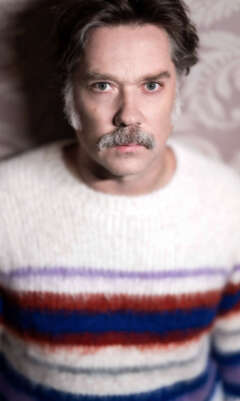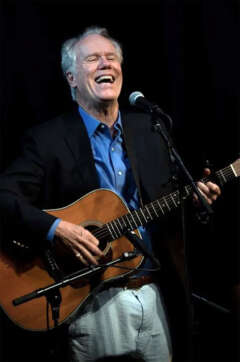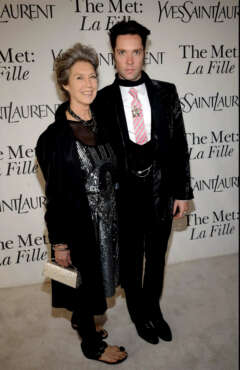Featured Stories
Rufus Wainwright: A Bright and Shining Star

Rufus Wainwright
Rufus Wainwright has been on a roll his entire 52 years of life on the planet. When he first raised his voice to sing as a small child, there was a mutual embrace between the singular artist and the collective cosmic Muse of Music that has produced so much beauty and soul in the world. The genre never mattered to him. From his birth day to the present day, he has been open to many varied forms of the ethereal reality we call music. He has pursued the words, stories, and the melodies that have lived so vibrantly in his life: He is without a doubt an artist of our life and times with a calling that is greater than a world that is so weary today with corruption, anger, and sadness.
Born into a musical family, Rufus Wainwright was exceptionally gifted, with a voice that is as much an instrument as any made by human hands. His father, Loudon Wainwright III, is a Grammy winning veteran singer-songwriter and recording artist who has influenced generations. His best-known song, “Dead Skunk (in the Middle of the Road)” was an international hit.
Wainwright’s mother was Canadian singer-songwriter legend Kate McGarrigle, who with her sister, Anna, sang and wrote their way into international fame with songs like “Heart Like a Wheel,” which became the title song for Linda Rodstandt’s 1974 album. The duo recorded albums and toured until 2010 when Kate died from cancer.
Loudon Wainwright and Kate McGarrigle married in 1973. They proceeded to conduct an often-tumultuous relationship that ended in divorce in 1977, when Rufus was three years old and a year after his sister, Martha, was born.

Rufus’ dad, Loudon Wainwright.
For the next several decades the family earned the title they were given by Time magazine in 2011, The Dysfunctional First Family of Folk Pop. This was due to Kate and Loudon’s prolific songwriting talents, which served to provide a sounding board for grievances, scandals, and heartbreak. Martha, a singer-songwriter in her own right, and Rufus endured the turmoil-in-song throughout their lives. But they became the best part of Wainwright-McGarrigle’s short-lived marriage.
As infants, Rufus and Martha were raised in Montreal, by Kate. She immersed them in love and music. According to Martha in a recent documentary, All I Want: A Portrait of Rufus Wainwright (2005), about her brother, she described how they listened to all of the music their parents loved with a radio always nearby. She touchingly describes how the siblings would sing along with the music they heard as babies, learning to find pitch and melodies. She said they would at times compete with each other in volume and duration. It’s clear to hear the talent and confidence in their adult voices this came from this mothering sonic nurturance. In their house they would listen to pop radio, opera, classical music, alternative rock, and folk music. This immersed them in a diversity of music that is rare for most children.
This family culture of music explains how Rufus Wainwright’s career grew over the years. His songwriting began in childhood.

Rufus and his mother, Kate McGarrigle.
While both parents of the Wainwright–McGarrigle family were celebrities, they were not household names. As the family friend, Tracy McLeod states in the documentary, “Their parents were not known as famous for being famous but were well known and loved by people who loved their music.”
But for Rufus, a music career would not be handed to him. His heritage allowed him opportunities to prove himself as an artist in his own right. He states in the film he knew he was gay by the time he was 13, which also influenced his desire to create and express himself to others. As is shown in one home film, he was able to capably perform Gilbert and Sullivan at 14. His family also gave him the motivation to do as well or better than his parents. It might be argued that he has succeeded in this with a simple glance at the scope of his career achievements. When he was 12, he and his sister toured with his mother and aunt as the McGarrigle Sisters and Family. This led to his vocal on the song “I’m a-Runnin’,” which from the movie Tommy Tricker and the Stamp Traveler at the age of 14, which resulted in the nomination for a 1989 Genie Award for Best Original Song. He was nominated for a 1990 Juno Award for Most Promising Male Vocalist of the Year.
When Rufus was 20, after years of visiting his father in New York City, he began to record demos of songs he had written. He describes how he approached Jeff Buckley in the East Greenwich Village to open shows for him. He describes with embarrassment how he was rejected by Buckley and others in the New York City music scene.

The NYC rejection sent him back to Montreal where he began his performing and recording career. His key demos were “Beauty Mark,” a song for his mother, and “Danny Boy,” for a straight friend he fell in love with. These demos were sent through his father, to Van Dyke Parks, who presented the demos to Dream Works. Rufus was signed to Warner Brothers, which released his first eponymous album. This began his career. As New York Times writer Anthony De Curtis, said, “There was a sense of authority that you usually encounter on a debut album. He arrived fully formed.”
Released in 1998, the first album was raved about by Rolling Stone magazine, and he received the Juno award for Best Alternative Album. He also received a GLAAD Media Award in the U.S. for his decision to not cloak his identity as a gay man. Elton John praised him, saying this would help so many young men to have the courage to come out.
Today, Rufus Wainwright has earned his place as a resource and example of popular artistry at its finest through a series of albums, tours, and theatrical projects that show his diversity, his range and his ability to take risks that pay off for himself as an artist and for our international culture.
His albums have explored modern folk music, opera, jazz, and pop standards. In 2007, he released and toured his first opera, Prima Donna, about a day in the life of an opera singer. In 2009, he won a Grammy for Best Traditional Pop Vocal Album. Beginning in 2007, he released a series of live albums and DVDs of performances paying tribute to Judy Garland, which was recorded at the London Palladium and Carnegie Hall. In 2023, he performed at Royal Albert Hall with a symphonic concerts of his two albums, Want One and Want Two, with the BBC.
With all of these successes in a life that seems called to them, Rufus Wainwright’s greatest success may be his daughter. Before she died, his mother, Kate McGariggle, told him that she wished he could give her a child. Wainwright, somewhere around 2010, before she passed, the news his childhood friend Loca Cohen, Leonard Cohen’s daughter, had offered him to father her child through sperm donation. Rufus accepted this and on February 11,, 2011, Viva Katherine Wainwright Cohen was born. A true child of musical royalty and a gift beyond words for those who have welcomed her into the world. The only regret in the heart of Rufus Wainwright is that Kate McGarrigle died before she saw this miraculous event unfold.
Somewhere in the heavens, we know, Kate McGariggle rests with pride over her song, Rufus and her beautiful granddaughter. And all the musical success throughout the ages cannot match this. But Rufus Wainwright will continue to work out his creativity through his restless and gifted spirit. It is a gift to us all to have lived in a lifetime when we can witness the career and legacy of Rufus Wainwright.
See Rufus Wainwright in concert on Monday, November 3, at the Belly Up Tavern in Solana Beach.










